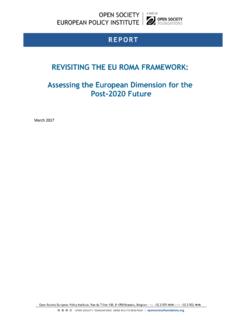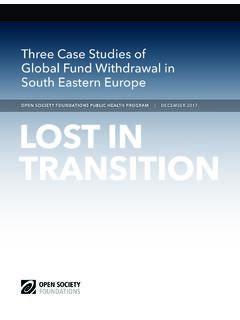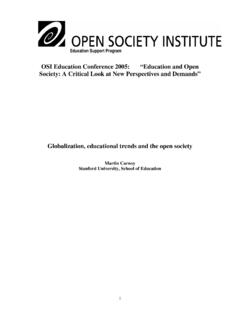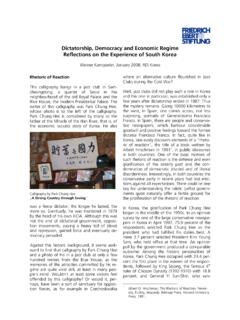Transcription of MODERN ALBANIA: FROM DICTATORSHIP TO …
1 A Conversation With Fred Abrahams Moderator: Aryeh Neier ANNOUNCER: You are listening to a recording of the Open Society Foundations, working to build vibrant and tolerant democracies worldwide. Visit us at BEKA VUCO: Welcome to the Open Society Foundations. Tonight-- we have the pleasure of welcoming-- Fred Abrahams, the author of MODERN Albania-- a book that we will be talking about tonight. Not only a book-- but also about the country, the MODERN Albania. My name is Beka Vuco. I'm the regional director for the western Balkans. And Albania is one of the countries that I cover as well through my work. So I'm quite familiar with-- with what's-- has happened and what is happening at this moment. And I'm so glad to see you all here tonight in this great number. So-- it is my pleasure to welcome also-- Mr. Aryeh Neier-- president emeritus of Open Society Foundation, who will introduce Fred tonight and start the conversation. And then we hope that people have some questions from you as well through the question and answer session.
2 So Aryeh, please. ARYEH NEIER: It's a great pleasure to-- to welcome Fred Abrahams here-- this evening-- to talk about his book-- MODERN Albania: From DICTATORSHIP to democracy in Europe. I-- I think this book-- is-- one that-- belongs-- here at the-- the Open Society Foundations. We feel-- a kinship to it-- in every way. " MODERN ALBANIA: FROM DICTATORSHIP TO democracy " T R A N S C R I P T 2 TRANSCRIPT: MODERN ALBANIA: FROM DICTATORSHIP TO democracy Fred-- went to Albania in the first instance-- under the-- the auspices of the-- the Foundations. His first job in Albania, I think, was at the-- the media center-- established by the-- the Foundation-- in-- Albania. Throughout his-- work-- on Albania, we have-- kept in touch. We've also kept in touch-- when he has veered away from Albania to deal with-- with other matters-- to deal with-- other parts of the-- the Balkans-- such as the-- the war in Kosovo or even when he-- was diverted to-- to Libya-- to-- undertake-- research-- there for-- for Human Rights Watch.
3 Most of-- of Fred's career has been spent-- on the-- the staff of-- of Human Rights Watch-- conducting research and-- writing reports-- for the organization. Fred has been one of the-- the emergency-- researchers-- for Human Rights Watch. Those are the-- the handful of-- of-- researchers-- who deal with the-- the most difficult-- situations and very often-- the most dangerous-- situations on behalf of Human Rights Watch. And-- their ability to-- to get-- the facts on-- various-- human rights violations and get it out-- fast and-- and reliably-- has been-- crucial for the organization and often-- crucial for the-- the protection of-- of human rights. So as an admirer of the-- the work of Fred and-- the other-- emergency researchers for Human Rights Watch, it's also a special pleasure-- to welcome him here-- this evening. Also for me, it's-- a very-- great opportunity to-- to refresh my own knowledge-- of Albania. In my early years-- with the Foundation-- I traveled to Albania-- very frequently-- because we-- had undertaken a particularly large project-- in Albania during that period.
4 After that-- I stopped going to-- to Albania and-- went to-- to other parts of the world-- more frequently. So it's been a pleasure to-- to read-- Fred's book, and to get-- up to date in that way, and also to get up to date by listening to him-- to him this evening. So, Fred-- it's all yours. FRED ABRAHAMS: All right. Well, thank you all so much for coming. It's a bit like a wedding or something, a bar mitzvah. So many different parts of-- of my life. So thank you. I hope you'll indulge me just for a moment-- because this is the official-- the launch of the first-- public event of the book. So-- I feel-- not just obliged but also deeply-- motivated and moved to just say a few-- thank-yous. So if you'll-- if you'll just bear with me for a moment. And-- the first goes to this-- esteemed institution. I actually-- I began the research for this-- book with a fellowship-- Open Society-- fellowship-- many, many-- years ago. And, of course, the money's good.
5 You know, it helped. And it allowed me to take trips-- go to Albania and begin the research. And that's important. But beyond that, you know, it's-- the motivational-- push. When you start a project like this-- by nature-- a lonely endeavor to write a book, it's critical to know that someone thinks it's a good idea. 3 TRANSCRIPT: MODERN ALBANIA: FROM DICTATORSHIP TO democracy And so that for me was far more important. So thank you-- Aryeh-- for that. And-- Garol Lamarsh (PH) was the head of the-- fellowship program at the time. No longer with the institute. And then the Balkans-- team. Beka-- Vuco, who you met tonight, Marina Pravdich (PH)-- who's helped a great deal tonight, Jonas Rolette (PH)-- and l-- Laura Silber (PH), who-- hi Peter (PH). Great to see you. Who I don't think is here tonight. And another person not here is Anette Laborey (PH)-- who was in-- Albania for-- many, many years for the Foundation. So-- I'm deeply grateful-- for that support.
6 And then-- there are a couple-- individuals here. Tani (PH) Puto, you may rise. Artan-- flew in from-- from Tirana. He's a professor-- of history at the university and-- really by far was-- the closest collaborator-- for this book. I don't know how many hours we spent in the bowels of-- the national library going through-- dog-eared copies of Zeri i Popullit, The Voice of the People newspaper from 1989 and-- and even before and-- talking to all the characters. And it's that kind of sounding board. You know, the person-- after you've just interviewed-- a ex-politburo member of the head of the party for Tirana. You need somebody to s-- look next to say, "All right. What'd you think? Let's-- let's hash this out." And-- you know, Tani, thank you. 15 years. Sorry. Yeah. (LAUGHTER) It's-- it's like a third child. (LAUGHTER) Then-- I don't know if he's here. He was supposed to come today. If he is, he doesn't have to stand up. But that's-- a dear f-- old friend, Fran Nozy (PH).
7 Is Fran in the house? (BACKGROUND VOICE) Where is the Noz? He doesn't have to stand. But-- actually Fran has-- a connection to this institution. For those of you who don't know, he was the first-- director of the Soros Foundation-- in Tirana. Worked there when I first went in '93. I think '91 to '93-- and-- was the-- was his-- his-- tenure. And really I think n-- no one-- more sort of lifted the curtain-- for me to peek behind-- and introduced me to a lot of people. If we spent many hours in the library-- I don't know how many crates of wine, and beer, and probably cigarettes-- we went through just hashing through-- you know, the events, and the people-- our mistakes-- and trying to understand-- what went on. Mi broma shenessee (PH). And-- well, I'm grateful for that. And-- and Fran always said-- "Please just hold a mirror. Hold a mirror to us as a people, as a country and-- help us-- to-- to understand-- to analyze and appreciate what we've gone through.
8 " So-- I hope I-- I've succeeded-- to do that. And when-- he was one of the first people to read the book and the finished the copy. And then he told me, "It's good. You know, I like it." And for me, whatever reviews may or may not come-- for me, that was-- by far the most important. So Noz, respect. And then lastly-- and I'll get onto topics of-- of-- greater interest, are my two lovely parents. I can't say any more without m-- making-- (APPLAUSE) and all of their friends. Probably half-- half the room are probably from your-- from your various-- school life 4 TRANSCRIPT: MODERN ALBANIA: FROM DICTATORSHIP TO democracy or friends. But thank you. Yeah. Okay. But with that, I-- I managed to-- to hur-- to hurtle that-- the difficult part now becomes the-- the easier part, to talk about this-- this topic-- I feel dear-- dearly about. I just wanted to do two things and to do it fairly briefly so that we could have some conversation.
9 One is to-- the process of writing this book and then the takeaways. A couple of the-- the nuggets that I-- I feel maybe-- I can-- can conclude. First, on the process. For me, wr-- writing this book had two very distinct parts. There was heaven. And there was hell. Heaven was s-- sitting in the coffee shops of Tirana talking to all the protagonists, actors, and actresses, the facteurs (?), the assets-- who played a role from the ex-politburo members to the Democratic Party founders, to the journalists, the lawyers, the gangsters, and the spies. What a pleasure. And-- for me, a particular joy-- because I witnessed many of these events. I went there, as Aryeh said, in '93, covered it for Human Rights Watch, and was an observer of many of these moments. So I had the good fortune to return, sit down with characters, and ask them, "What were you thinking when you did this? "Why did you make this move? Where were you at that time? Why did this all happen?
10 " And to piece to together this-- jigsaw puzzle. And, you know, of course, people spun their tales. Everybody had-- had a line. But people were also sincere. They also took their time. And the book would've never happened without their-- their contributions to it. So I'm-- I'm-- I'm deeply-- grateful for that. And then there's the source material. The library, the archives. I collected hundreds of f-- Freedom of Information Act or submitted hundreds of-- Freedom of Information Act requests and got a lot (NOISE) of documents back from the State Department and-- even some of the And-- you know, going through all of that was a real joy. As a side note-- all of that material-- posted on a website th-- that we made for the book. The key documents and the rest of the material is going to the Open Society-- archives in Budapest and also the National Security Archives in Washington so that students, and scholars, and journalists, and others can benefit from this material and may it be used.













